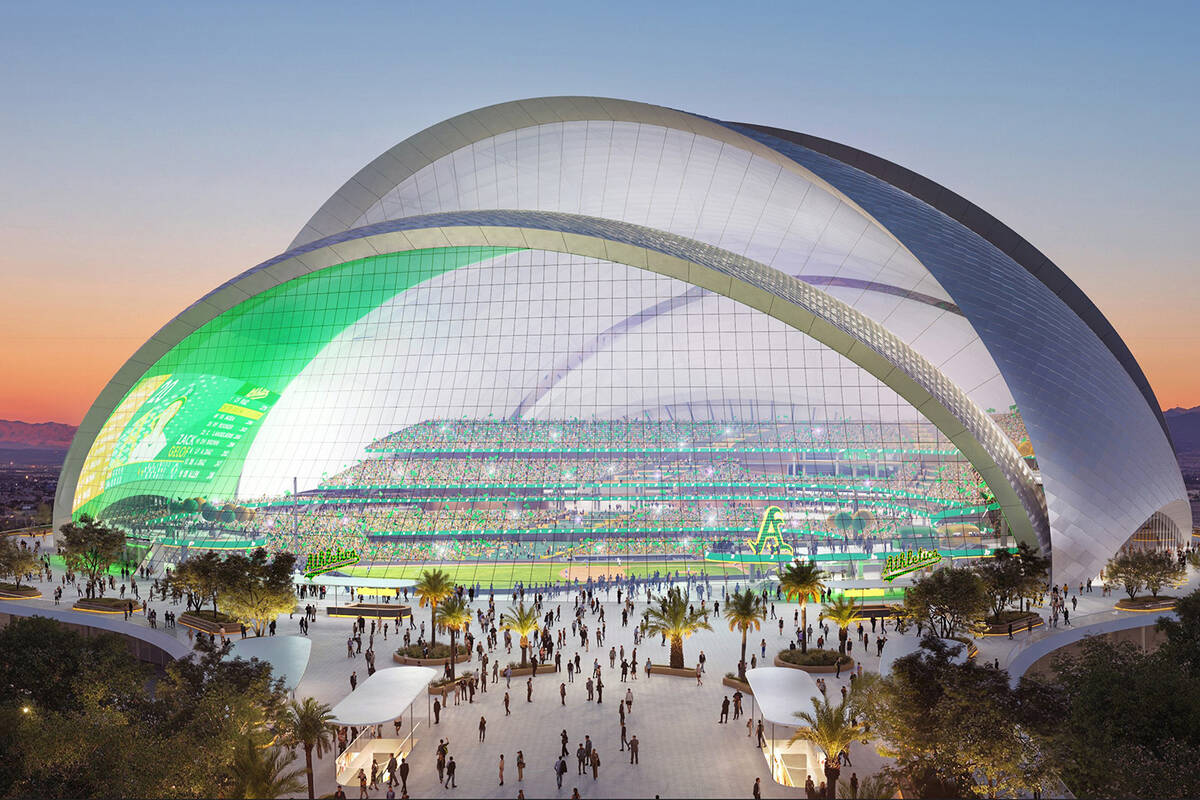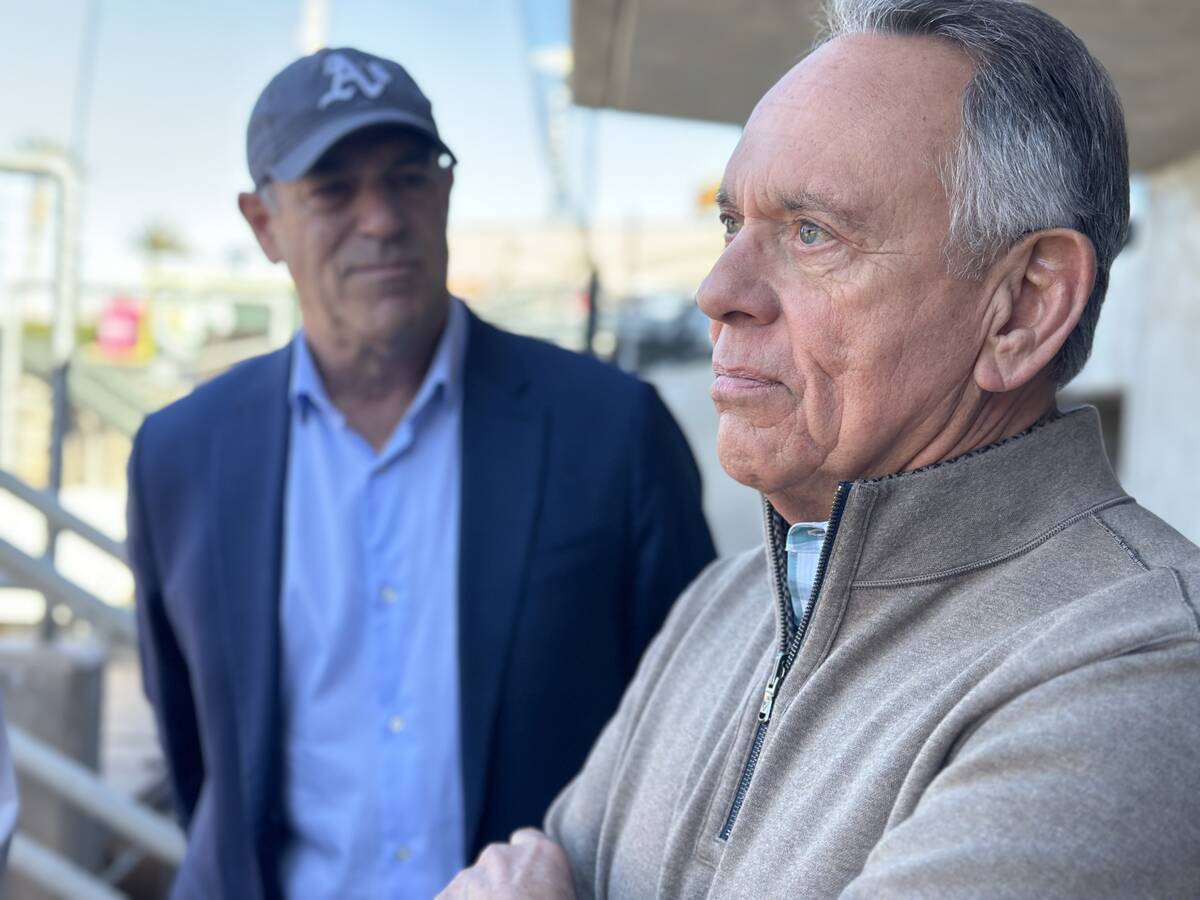When will the A’s and Clark County hammer out a Vegas ballpark development deal?
Clark County is waiting for the Oakland Athletics to finalize their dealings with the Las Vegas Stadium Authority before they fully engage with the team in a development agreement for the team’s planned Strip ballpark.
Clark County Commissioner Jim Gibson said he’s seen proposed outlines of potential dates, but a lot of the timing is tied to when the A’s have the stadium nearly fully designed, finalize their agreements with the stadium authority and then the county will get the matter on a meeting agenda.
“There probably is in somebody’s mind, but we don’t have a hard timeline yet,” Gibson told the Review-Journal last month. “They need to get things resolved with the stadium authority and after that occurs we will be sitting down together.”
Lobbyists for the A’s have met with various Clark County commissioners multiple times over the last year, as recently as Monday, when commissioners Michael Naft and William McCurdy were provided an update on the project, according to county records.
Agreements, financial plans next
The A’s are negotiating with the stadium authority on development, nonrelocation and lease agreements. Near final versions of those agreements are expected to be presented at an Oct. 17 stadium authority meeting. The agreements could be approved at a Dec. 5 meeting.
“I know at the end of the year that they’re intending to approve all three of the agreements, I think it’s going to be happening here,” Gibson said.
A’s President Dave Kaval told the Review-Journal last month that the stadium is about 50 percent designed. Stadium construction team Mortenson-McCarthy last month revealed the bid schedules for various aspects of the ballpark construction project.
Between now and December, the A’s must also detail their stadium financing plan for the $1.5 billion project. A’s executive Sandy Dean previously said the ballpark will be paid for by up to $850 million in equity from team owner John Fisher’s family; $350 million of the available $380 million in public funding; and $300 million in debt financing taken on by the team.
The team could offset the Fisher family’s equity contribution by bringing local investors into the project. Those local investors would receive minority shares in the team in exchange for money put toward the stadium’s construction.
The agreements with the stadium authority and county and securing the needed financing for the ballpark are required by Senate Bill 1, in order to make the up to $380 million in public financing available to the team.
Certainty in project
Although the team has yet to reveal its detailed financing plan, Gibson has no doubt the project will move ahead as planned. Next week the Tropicana is set to be imploded to clear the site for the start of construction of the A’s planned $1.5 billion ballpark, scheduled to begin in the second quarter of 2025.
“We’re confident that the stadium is going to be built, even though in the media there has been a lot of attention that they’re playing here and playing there,” Gibson said. “We are certain that we’re going to have a stadium.”
The MLB team plans to build the 33,000 fan capacity stadium on 9 acres of the 35-acre site. Tropicana owner Bally’s Corp. plans to build a future resort on the remaining acreage surrounding the ballpark. After completing the team’s final season in Oakland last week, the A’s will play in a Triple-A ballpark in Sacramento for the 2025-2027 MLB seasons.
Once the A’s have the needed items squared away with the stadium authority and they engage in the development agreement process with the county, Gibson said they will move at a pace comfortable to their staff.
“We’re not going to be doing any extraordinary rushing around,” Gibson said. “We’ve talked to them (the A’s) about how important it is to let us use our people the way that we designed the system and they know that. I think we’re going to be just fine.”
Transportation options
As part of Senate Bill 1, Clark County also will contribute $25 million toward transportation improvements around the stadium site. What those improvements will entail have yet to be determined, Gibson noted.
“The county works with the Boring Company all the time,” Gibson said. “We know all of that will become important, but there are no decisions that we’ve made up front. What we’ve got to see first is what the layout really is. The fine detail isn’t something we’ve looked at, we’ve seen the same pictures you’ve seen. When we see all of that, we will have a better idea. Is it a pedestrian bridge that we build, or something else.”
Contact Mick Akers at makers@reviewjournal.com or 702-387-2920. Follow @mickakers on X.















